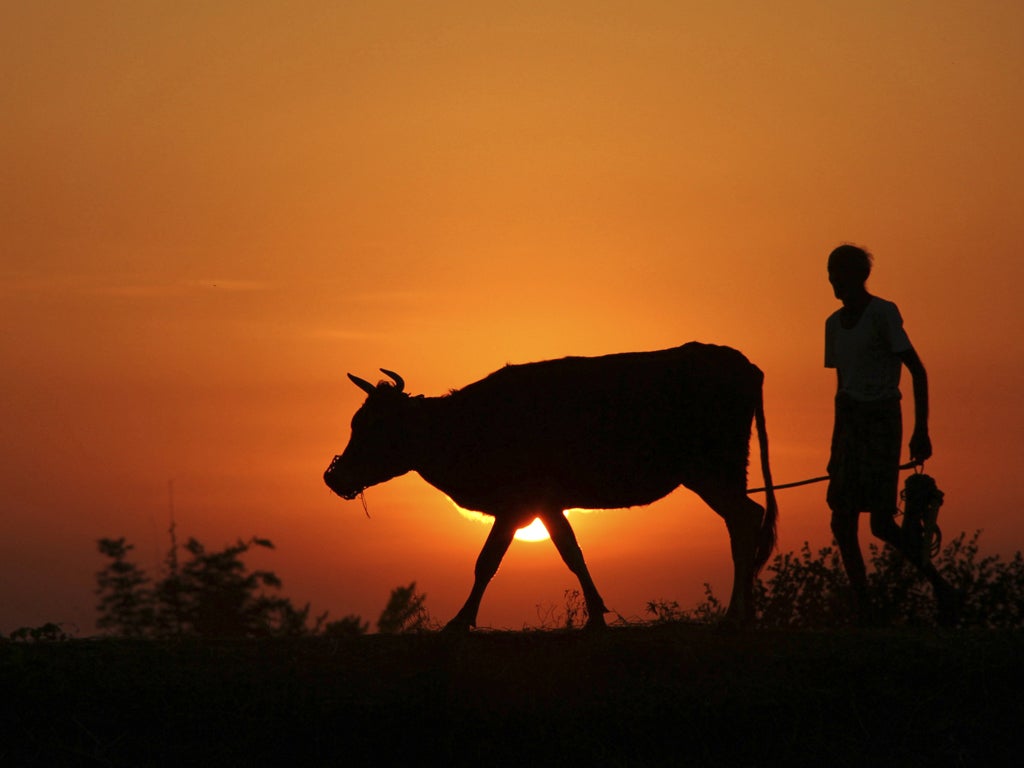
Your support helps us to tell the story
From reproductive rights to climate change to Big Tech, The Independent is on the ground when the story is developing. Whether it's investigating the financials of Elon Musk's pro-Trump PAC or producing our latest documentary, 'The A Word', which shines a light on the American women fighting for reproductive rights, we know how important it is to parse out the facts from the messaging.
At such a critical moment in US history, we need reporters on the ground. Your donation allows us to keep sending journalists to speak to both sides of the story.
The Independent is trusted by Americans across the entire political spectrum. And unlike many other quality news outlets, we choose not to lock Americans out of our reporting and analysis with paywalls. We believe quality journalism should be available to everyone, paid for by those who can afford it.
Your support makes all the difference.Even in the dog days of summer, the quiet paddy fields between India and Bangladesh look as green as a window box. But the daytime tranquility belies a stark reality. This delta region of the Ganges river is a place of often deadly conflict that underpins an activity many in India would rather not discuss. Every year, hundreds of thousands of cows, sacred in India, with their export banned, are smuggled into Bangladesh where they are turned into shoes, belts, bone china crockery and, of course, meat.
"There is smuggling here every day," said Umesh, a member of a three-man Indian Border Security Force (BSF) team on duty at a watchtower near the village of Kaharpara, near the Bangladesh border. "The smugglers will take 50, 100 or 200 cattle at a time."
The story of the annual smuggling of an estimated 1.5 million cattle says much about modern India – about the sometimes hypocritical treatment of supposedly sacred cows, the political power of right-wing Hinduism and the corruption that allows the £320m trade to flourish. But ultimately this story is about supply and demand. Hindu-majority India has an estimated 280 million cows but killing and eating them is legal in only a handful of states. Meanwhile, Muslim-majority Bangladesh, where beef is eaten with relish, suffers from a shortage of cattle. Half of the beef consumed in Bangladesh comes from its large, western neighbour.
The snaking border that divides the two countries runs for 1,300 miles. Here in the Murshidabad district of West Bengal, large sections of it are unfenced. It is a lure both for human traffickers and gangs from both sides of the border smuggling cows. Villagers said cattle were brought by truck from Indian states such as Bihar, Orissa and Jharkhand. Despite the effort involved, the mathematics is persuasive. An animal that might sell for £60-£80 in the country will fetch £130. Once inside Bangladesh, that could be £225 or more.
Yet the trade comes with a deadly price. A 2010 report published by Human Rights Watch (HRW) suggested that more than 900 people had been killed with impunity by the BSF over the past 10 years.
"Over the last decade, they used excessive and indiscriminate force, shooting at villagers on suspicion that they were smugglers," said Meenakshi Ganguly, HRW's south Asia director. "While many may have been engaged in cattle rustling, the BSF ignored the most basic principles of protecting the right to life. Instead of arresting suspects, they shot and killed them."
Asked about the allegations, a BSF spokesman said: "The BSF is a disciplined and professional force [and] exercises utmost restraint in the use of any force. The BSF has also an impeccable record of upholding human rights."
Ashfaqur Rahman, a retired Bangladesh diplomat who now chairs the Dhaka-based Centre for Foreign Affairs Studies, said the matter was sensitive but that legalising the export of cows or beef would put an end to corruption and violence. An irony is that India is expected to become the world's largest exporter of beef - from non-sacred buffaloes, rather than cows - by next year. Cows have been considered sacred in India for centuries, and in only a few states is killing and eating them legal.
There have been attempts by the Indian authorities to review the ban on cow exports. Earlier this year, a report by the government's central planning committee suggested changing the law to allow the export of beef. The plan was hastily dropped and explained away as a "clerical error" amid an angry backlash from right-wing Hindu organisations such as the Vishwa Hindu Parishad and so-called "cow protection" groups.
Join our commenting forum
Join thought-provoking conversations, follow other Independent readers and see their replies
Comments